- Home
- Nancy Pickard
No Body Page 11
No Body Read online
Page 11
“Maybe he didn’t love her.”
Again, that slow shake of the head. “No, he wouldn’t have married her unless he loved her, and I suspect that once loved by Darryl, always loved by Darryl. I’m surprised he didn’t marry his first sweetheart, that’s the kind of loyal little fellow he was. She must have left him, because he would never have left her.”
“Who?” I asked. “The first sweetheart, or Sylvia?”
“Both, dear.”
Darryl Davis sounded grimly possessive to me, but I didn’t say so. Instead, I commented: “I do believe you’ve taught just about everybody in this town at one time or another, Miss Grant.”
She turned to smile at me, and her eyes were wise with eighty years of living. “But I have been a student, too, of all of you. We’ll attend the graveside service, dear.”
“We commit unto your care, Oh Lord, our friend and daughter, wife and sister, Sylvia. May the Lord bless us and keep us, may the Lord shine His face upon us and . . .”
While the other mourners had their heads down and their eyes closed, I took the opportunity to stare at them. Stan Pittman and his father stood together near the coffin, their hands identically clasped in front of themselves, their feet identically spread about six inches apart, their heads deeply bowed. Russell Bissell and Beryl Kamiski stood behind them. Beryl, who was dressed in a navy blue dress that had the unmistakable look of high design, had a tissue clutched in one hand, a purse in the other, and her head was deeply bowed. I glanced down the gorgeous but sedate dress, past slim ankles to her shoes. They were a $250 number if they cost a penny; or maybe she was simply one of those shoppers who can smell a sale the way certain pigs sniff out truffles. I looked at the man next to her. At that moment, Bissell raised his golden head. I watched as he looked in the direction of the relatives, who were gathered under a green canopy. Then he seemed to look at the backs of the Pittmans’ heads, and finally in my direction. When he saw me looking back at him, he looked surprised, then smiled a slow, sad, funeral smile. I nodded, then glanced away, only to meet the eyes of Lewis Riss. He grinned. I looked past him, on around the crowd until I came to Ailey Mason. He didn’t grin at me, but jerked his head in a “come here” motion. I frowned back with a “wait a minute, for heaven’s sake” expression of my own.
There was a lot of silent communicating going on around that grave, but it was the silent thoughts I wished I could hear. Were we all remembering that first, failed attempt to bury Sylvia? Was there anyone among us who was at that moment reliving the experience of placing her in that first coffin with the man who was allegedly her lover?
“. . . now and forever more . . .”
I felt a large rough hand slip into my own. I squeezed gently, and hung on. Beyond the grave, the three gravediggers were leaning against a walnut tree. The two black men had their eyes on the minister, the white kid was staring at me. When I looked at him, he nodded as if confirming something. Feeling suddenly nervous, I finally bowed my head.
“. . . Amen.”
“Jenny, dear.” I looked up to find Miss Grant gazing at me with a pained, puzzled expression on her face. “I’m afraid I have a touch of arthritis in that hand.”
“Oh, I’m sorry!” I quickly released her hand, which I hadn’t realized I was gripping so tightly.
“Is anything wrong, my dear?”
“No, no.” I smiled at her. “Will you excuse me for a few minutes, Miss Grant?”
She said she would wait for me under the canopy, where she wanted to go to offer condolences to the family. Miss Grant swung away on her crutches, and I walked over toward the detective.
Ailey Mason stood on the hummock of a fresh grave, apart from the rest of the crowd. In his Kojak trench coat and slouch hat he couldn’t have looked more conspicuous. I suspected the positioning, at least, was a purposeful move to agitate his suspects. Whether he had also considered its effect on the innocent survivors, I didn’t know.
“Heard from Geof?” he inquired by way of greeting.
“Only on my answering machine,” I replied. “You?”
He shook his head. “How come you’re here? Did you know her? Or maybe you’re one of those nuts who just likes to go to funerals?”
I waited a moment before I replied. “No, I didn’t know her. But my sixth grade teacher did. I brought her as a favor.”
“Well, since you been hanging around the funeral home, you hear anything I want to know?”
“I guess you’ve heard she was allegedly having an affair with John Rudolph?”
“Yeah, him and the Boston Celtics.” Ailey’s laugh was a short bark, like a bad-tempered dog’s. “That broad oughta had a king-sized bed to hold all the men she was fucking.”
“Rumors.”
“Yeah, like the rumor that the sun comes up in the east. You hear any other names attached to those rumors?”
I thought back to Muriel Rudolph’s hysterical accusations in the funeral home the night before.
“No,” I said. “Do you have any good suspects, Ailey, or any motives?”
He laughed as if it were a stupid question. “I got a jealous wife, for starters,” he said, ticking it off on a finger and saying it slowly, as to a dimwit. “And a husband she was cheating on. And maybe some jealous lovers. And for motives, I got sex, sex, and more sex.”
“Did you come up with any fingerprints you can use?” He took it personally, as criticism. “You been promoted to captain or something, and nobody told me? Maybe I should make my reports to you now, is that it?”
Again, I waited a moment. “It was just a question.”
“No,” he said shortly, which I took as my answer.
“What about that office party?” I asked.
“You want to be a goddamned detective,” he said then, “I tell you what you do. You take some of that money you got, and you buy yourself a nice jeweler to make you a sterling silver sheriff’s badge, how about that? And maybe buy yourself some fancy bath powder, use it to dust for prints, you know? And then you buy yourself a little toy gun, like they sell in the toy store, and . . .”
“A trench coat,” I said, and walked off.
It seemed Ailey was getting nowhere on his first solo case and feeling mighty defensive about it.
Miss Grant reached out a hand to me when I approached the green canopy. “Jenny, I want you to meet Sylvia’s husband, Darryl Davis.” The sad-faced young man who had been in the limo with Sylvia’s sister had his right arm around a woman, so I didn’t offer my own right hand for him to shake.
“Hello,” I said, but he didn’t even look up at me.
It was the much older man standing next to him who spoke—the man with a Marine haircut who had stood guard by Sylvia’s coffin in the funeral home, the one I’d taken for her father. His hands were clasped behind him like a drill sergeant. I tried to cover my surprise, but it wasn’t necessary. He met my eyes for only a second before turning his face to receive other expressions of sympathy. But in that second, I felt as if I were held in a fierce grip of anguish.
“I’m so sorry,” I murmured to the side of his face.
How he must hate us all, I thought as I guided Miss Grant back to my car, for being witnesses to his humiliation and to the destruction of his beloved wife’s reputation.
It was nearly three o’clock.
I sped Miss Grant home so that I could be on time for Lewis’s interview. I figured I would hear Muriel Rudolph take what little was left of Sylvia’s reputation and smash it to smithereens.
17
Lew’s car was parked on the street outside the row of condominiums where the Rudolphs lived on Brooklyn Terrace. I parked behind his car then walked past the identical town-houses until I reached 2532.
Like its neighbors, it was a narrow two-story house on which thin boards and rough plaster were stuck to the facade to simulate Tudor. The grass in the front yard had given up the fight to children’s bikes and balls, but someone—Mrs. Rudolph?—had trimmed the hedges and set out earl
y annuals, which bobbed cheerfully in the light, cold breeze. Hello, hello, they said. Not a bad place to come home to after a hard day at a funeral home, I thought, a place that spoke of innocence and caring, not of jealousy and revenge. If what the widow had claimed the night before was true, however, the philandering man of the house had not been innocent or so caring of the welfare of this household. I wondered, with a touch of dread, how she would act this afternoon . . . would she still be stiff and furious or would she be embarrassed, regretting her promise to the reporter to air her family’s laundry in public? Sex, sex, and more sex, Ailey had said. But Muriel Rudolph didn’t look like a woman who, under normal circumstances, would discuss that subject with strangers. But these weren’t normal circumstances.
The front door was ajar, so I knocked lightly.
Lewis appeared instantly. He grabbed my wrist and pulled me inside. “Get in here,” he said. “Don’t touch anything.”
“No,” I said, not to him, but to the implication behind his urgency and his words. There are only a few reasons in the world to tell someone not to touch anything—one is to protect fresh paint, one is a warning to small children in glass houses, the third is for the benefit of the police.
“Oh, Lewis,” I said. “Oh, no.”
He dragged me by my wrist into the house, toward the kitchen. We passed through a tidy living room and a tidy, small dining room. I saw the sort of matching suites of furniture that young married couples buy on installment plans at discount stores; evidently, the financial strain of raising three children had kept them from replacing that furniture through the years. But she had kept it repaired and clean, so it looked merely old, not shabby. I saw fat, green Boston ferns in macramé holders that were suspended from the ceilings, and I saw that she had cut some twigs off a flowering viburnum and stuck them in water in a glass pitcher that sat on an orange runner on the dining-room table. The little white flowers had started to shed, forming a soft halo of snow on the table. Their fragrance filled the room with the smell of spring. Again, I thought, not a bad place to come home to. Tight budget or not, somebody had cared about this house. My heart was yammering unpleasantly, and my breath was coming short and fast.
Lewis pulled me into the kitchen.
There was a small black-and-white television set on a TV tray, turned on but with the sound off. I watched a beautiful man kiss a beautiful woman. There was coffee warming in a pot on the counter, but it looked thick and black as syrup, as if it had sat for hours. On the formica top of the kitchen table, there was a transparent glass mug of coffee, half-drunk, with a scrim of milk floating on top. A ballpoint pen lay beside an open morning newspaper, and there was half a plain cake doughnut and a little pile of crumbs beside a white paper napkin. I was absorbing every detail, because I was avoiding the larger picture. It was in most respects an ordinary picture of an ordinary kitchen where, after the kids leave for school, a mom sits down to enjoy her morning coffee, with a doughnut, the TV, and the word games in the paper.
This mom was still dressed in her nightgown, robe, and slippers, and she lay on her back on her kitchen floor near the coffee maker. Beside the Mr. Coffee, there was an empty mug, a clean spoon, a half-pint of milk—its mouth gaping like a thirsty bird’s—and an open sugar bowl. If she were still alive, she might have been saying, “How do you like your coffee? Milk? Sugar?” Maybe she would have asked Lewis and me if we would like a doughnut.
“Just like the other one.” He called me back to the way things really were, his voice sounding low, flat. “Just like Sylvia.”
Muriel Rudolph’s tiny hands were wrapped around her own hair and it was wrapped around her throat. Her face was dark, contorted, and dreadful. I thought of the teenage daughter I had seen at the memorial park the day John Rudolph was buried and of how protective the girl was of her younger brothers. She would lose her youth now.
“She had children,” I said to Lewis. “She had children, for God’s sake.” I was suddenly, irrationally furious at a world that allowed people to go around killing mothers, as if there ought to be a special, unbreakable law against it.
“I’d better call Ailey,” he said. His complexion was a sickly white against the black stubble of his beard. He still wore the tennis shoes, jeans, turtleneck, and sweater of the night before. “You don’t have to stick around, Jenny. She didn’t even know you were coming. You didn’t find her. If you cut out now, I’ll forget you were here.”
It was the only thoughtful thing I had ever heard him say, and it made sense. Ailey would only waste time on me, when he could be looking for real leads. I tried to think what Geof would advise, and then I nodded.
Lewis stepped to a wall phone to make the call. I noticed that he took a napkin from the table to cover the receiver, to protect any fingerprints that might be there. While he spoke to the police, I stared at the kitchen table.
She had sat there, drinking her coffee, eating her doughnut. Did her doorbell ring? Did she go to the door, invite the visitor into her home, offer a cup of coffee, a doughnut?
I stepped up to the table to look at it more closely. The newspaper that lay on it was turned to Lewis’s most recent story on the murder investigation. She had circled his byline with her pen. I studied the napkin and the crumbs beside it, and then I turned the napkin over, though I only touched it by a corner. There, on the down side, she had written the name Riss across the top, followed by a list of other names—Pittman, Bissell, Friedman, Smith, Rudolph, and a few I didn’t recognize. She had also written the word party and the word bitch. An angry hand had retraced each letter of the last word several times until the letters ate into the thin paper of the napkin.
“Jenny, what are you doing?” I turned around to see that Lewis had hung up the phone. “Don’t touch anything!”
“Look at this, Lew.” He walked over to stand beside me, and I pointed at the napkin. “She was making notes to herself about what she was going to discuss with you. Look at these names.”
“Guys that Sylvia was . . . ?”
“I guess Mrs. Rudolph thought so.”
“How’d you find this?” He sounded annoyed, as if he had missed a trick.
“What do you do if you’re having a bite to eat and you suddenly think of something you want to jot down? You dump the crumbs off your napkin, and you write on it. I saw the pen, and I saw the crumbs, and . . .” I shrugged.
“But she turned the napkin over.” He said it slowly, as if he were thinking as he spoke. “Because . . . because she didn’t want the person who was here to see her list! Because he was on it! Jesus, Cain. I think what we’ve got here is your basic dying woman’s last words! And a nice little list of suspects. Too bad she didn’t circle one of them for us, you know what I mean? Like ‘this is the one who done it, guys, lock him up.’”
I glanced at him, then away.
“I know,” he said quickly, angrily. “You think I don’t know? She got killed because I was coming to see her. You think I’m stupid, Cain? You think I don’t know that?”
“Keep your voice down.”
“Screw you,” he said bitterly, “This ain’t the way I want to win a Pulitzer.’
“I know that.” But I couldn’t bring myself to offer a touch or words of comfort. Maybe she would have died anyway because the killer didn’t want her to talk to anybody, ever, about Sylvia’s love life. But maybe, in the absence of a curious reporter, she would have calmed down, kept quiet, stayed alive. We would never know, but I suspected it was a question that Lewis would ask himself all his life, Stan had asked Lewis to leave her alone, saying she was hysterical, saying it would be a kindness to leave her alone. God knows he had been right about that.
“I’m leaving,” I said.
On my way out, I stopped to sneak a look at some papers that were spread out on a coffee table in the living room. It looked as if she had been going through the file that contained her husband’s estate planning. Using a handkerchief, I moved the papers slightly so I could skim their contents.
There was: a simple will, everything straightforwardly left to her and the kids; a key on a string, labeled “safety deposit box”; a passbook-savings book with a balance of $10,972; a term life-insurance policy to pay off their home mortgage if he died; another policy to pay her a small amount if he died; titles for two cars; the deed to their property; mortgage loan papers from a bank. That was it—a simple estate left to a small family by a man of modest earnings. Unless there were investments that weren’t reflected in this file, she would almost certainly have had to go to work to support herself and the children. But he had seen to it—or she had insisted that he see to it—that she would have the house free and clear, a little money, a couple of cars, some savings. Maybe he had cared, after all, in his fashion.
A siren sounded not far away.
I looked up to find that Lewis was standing in the kitchen doorway, shaking his head at me. “You ever think about going into journalism, Cain? Anything interesting in those papers?”
“No. It all looks normal to me.”
The siren was getting closer.
I nudged the front door open with my elbow, and left. As I pulled my car away from the curb, Ailey Mason and two other cops were striding up to the front door of the Rudolph home. Ailey wore his trench coat, and the belt was still twisted in back. A body wagon came down the street at a sedate pace and double-parked beside the squad car.

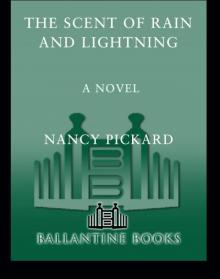 The Scent of Rain and Lightning
The Scent of Rain and Lightning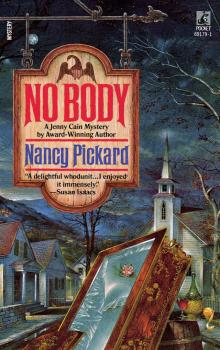 No Body
No Body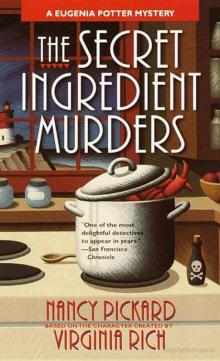 The Secret Ingredient Murders: A Eugenia Potter Mystery
The Secret Ingredient Murders: A Eugenia Potter Mystery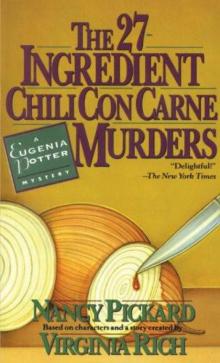 The 27-Ingredient Chili Con Carne Murders: A Eugenia Potter Mystery
The 27-Ingredient Chili Con Carne Murders: A Eugenia Potter Mystery Twilight
Twilight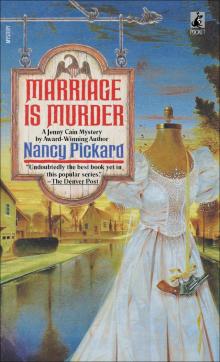 Marriage Is Murder
Marriage Is Murder I.O.U
I.O.U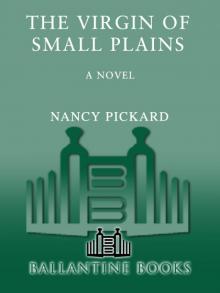 The Virgin of Small Plains
The Virgin of Small Plains Generous Death
Generous Death The Whole Truth
The Whole Truth The Blue Corn Murders
The Blue Corn Murders Say No to Murder
Say No to Murder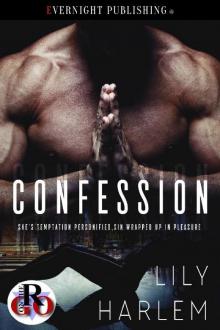 Confession
Confession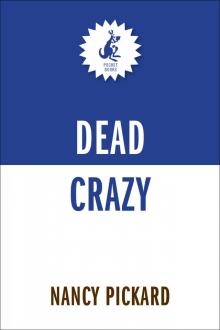 Dead Crazy
Dead Crazy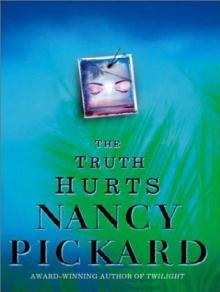 The Truth Hurts
The Truth Hurts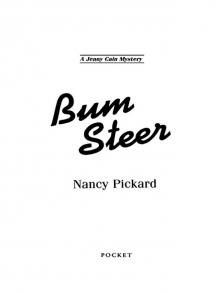 Bum Steer
Bum Steer